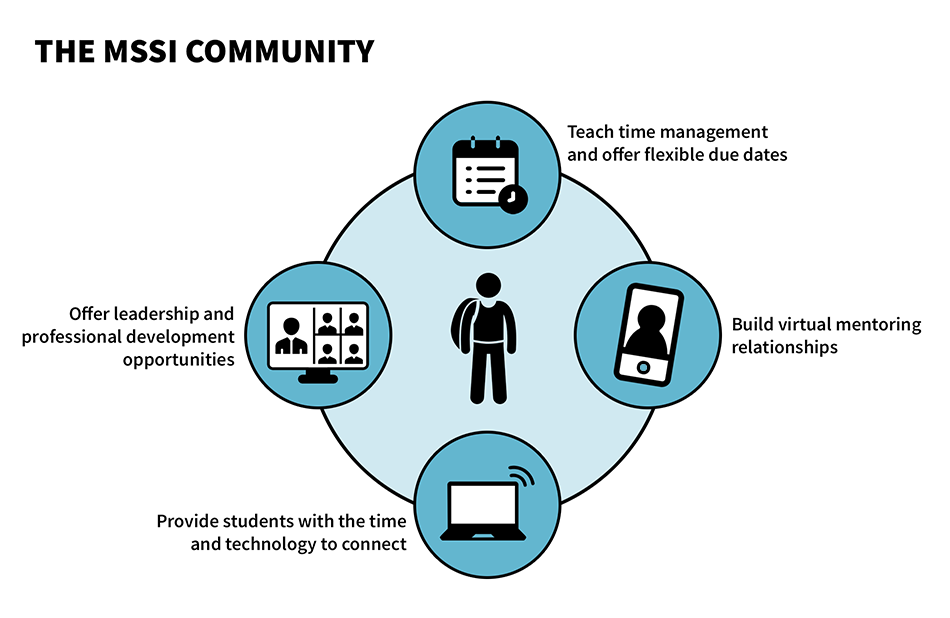Supporting the Success of Male Students of Color During COVID-19

The COVID-19 pandemic forced many colleges to move online by mid-March 2020, with little preparation time to serve new student needs arising from the health crisis. As faculty, administrators, and staff at the Community College of Baltimore County (CCBC) shifted gears to online learning, the group that runs the Male Student Success Initiative (MSSI)—which MDRC is studying in the Men of Color College Achievement (MoCCA) Project—took extra measures to deepen its commitment to supporting and mentoring its students.

MSSI includes an ambitious set of research-based services to support male students of color, including a first-year student success course geared toward the experiences of men of color, mentoring from MSSI success mentors (program staff members who are men of color as well), connections with student support services on campus, leadership and professional development opportunities, and community-building activities that reflect racial and ethnic identities. For many MSSI students, the college’s move online presented new challenges.
“I kind of miss being in class around people. It was motivating to see people [who] want to work as hard as me.”
The college addressed these challenges in four ways:
Teach time management and offer flexible due dates
Prior research shows that time management contributes to college success. For many MSSI students, online learning proved challenging.
“I never wanted to take online classes in the first place, ‘cause I don’t really learn that way, from the computer,” said one MSSI student. “Having to transition to being on the computer and learning from home, it’s basically like teaching ourselves.”
Some MSSI students also faced new work-life challenges while adjusting to self-guided online learning. “Now that I have the luxury of—I can do anything I want, I find myself procrastinating a lot,” said one student.
Because many students took on part-time or full-time work during the pandemic, instructors teaching the required MSSI first-year student success course modified its content and due dates. One instructor advanced the course’s time management unit to the second week of class to help students better manage during the new, challenging circumstances. Instructors adopted more flexible due dates for assignments to accommodate students’ work schedules and tech troubles.
Build virtual mentoring relationships
MSSI success mentors, part-time MSSI staff members who are trained in culturally responsive mentoring and coaching, strive to meet with their students for at least three mentoring sessions per semester. Mentors shifted from in-person meetings to online platforms for video calls, or connected by phone. Between sessions, mentors email and text their students.
One student, who still stays in contact with his mentor, says he gets valuable encouragement, such as his mentor telling him, “‘Hey, keep your head up . . . Keep doing your thing. All you can do is try your best.’ And then he’ll ask me, ‘If there’s anything you need help with, shoot me an email and I got you.’”
During pre-pandemic in-person sessions, some success mentors helped students identify their needs regarding financial aid, career services, and tutoring—then walked their mentees to those support offices on campus. In 2020, one success mentor said the online version of that support meant sharing his screen and showing his mentee how to navigate the CCBC website to access those same services.
Keeping both cameras on during online meetings proved helpful. Mentors said using video helped build personal rapport and aided in reading students’ body language but did not fully make up for not being able to meet in person.
One student said virtual mentoring sessions helped and his mentor “still is supportive. He helps out a lot, actually.”
An MSSI student said,
“[My success mentor] is pretty much the only person that I really talk to school-wise . . . during the pandemic. He helped me a lot ‘cause at first, it wasn’t looking too good for me, and I didn’t really know what to do. But I ended up calling him, and he talked me through it. I’m on my way to finishing my semester.”
While the content of the sessions remained constant—students continued to check in on how they were doing academically, mentally, and emotionally—one mentor said he now focused more on professional communication skills and self-advocacy with his students.
Provide students with the time and technology to connect
Last spring, MSSI staff members and leaders prioritized making sure that students had the necessary technology to stay engaged with schoolwork and the MSSI community. They helped students get laptops and access to Wi-Fi hotspots. “Most of [that information is] either relayed to me through my teachers or sent directly to my CCBC email,” said one student. “I mean, I think I have to commend the school on their response to the crisis.”
To disseminate information about technology, grading policies, and other campus announcements, program staff members hosted a monthly video call with students and staff members to sustain community, identify student needs, and keep students engaged—even hosting an end-of-semester celebration.
“It was actually pretty cool to just sit down with a couple men of color and kind of talk about our personal life, how things are going right now. And just things we can do to help better ourselves. I think it just kind of spiraled out to where once we were done talking about each other and how we can help, it just came into a talk about our interests.”
Offer leadership and professional development opportunities
Prior research shows the importance of leadership and professional development activities for students of color as they navigate college and plan for their futures. MSSI created new ways for students to pursue professional development and culturally relevant activities both inside and outside CCBC during the pandemic. Through virtual coaching, CCBC faculty continue offering students additional academic support. The program sent students to the Maryland Male Students of Color virtual summit and planned virtual information sessions for spring 2021 with local four-year Historically Black Colleges and Universities to replace in-person tours.
Attendance for the online leadership and professional development activities was uneven, and it was difficult to predict how many students would attend. But program leaders remained aware of the vital importance of engagement, community, and mentorship to MSSI. The program sought to meet new challenges and continues to create an online community that supports students who are dealing with heavier work schedules and staying on track academically, while lacking in-person relationship-building time. Numerous MSSI students said the support and flexibility offered by the mentors and professors helped them adjust during the most stressful parts of a pandemic school year when they otherwise might have given up.






